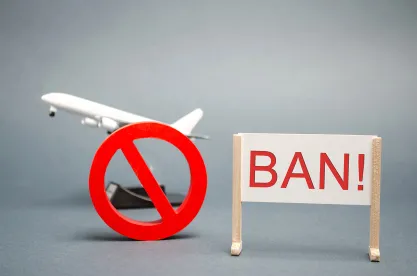On November 26, 2021, President Joe Biden issued a presidential proclamation prohibiting travel into the United States for travelers who were physically present in eight countries in southern Africa (Botswana, Eswatini, Lesotho, Malawi, Mozambique, Namibia, South Africa, and Zimbabwe), beginning on Monday, November 29, 2021. The restrictions, which prohibit travel from these eight African countries, come approximately three weeks after the White House relaxed prior location-based travel restrictions, moving to vaccination status-based travel restrictions on November 8, 2021. The November 8, 2021, presidential proclamation, revoked prior country-specific COVID-19 travel restrictions and permitted air travel into the United States for fully vaccinated nonimmigrant travelers.
Reasons for the Ban
President Biden stated that the new travel restrictions are in response to the new B.1.1.529 (Omicron) COVID-19 variant identified in the Republic of South Africa on November 24, 2021. The newly identified variant has been classified as “a variant of concern” by the World Health Organization (WHO), and it is suspected that the new variant includes multiple mutations. According to the presidential proclamation, the WHO found that “preliminary evidence suggests an increased risk of reinfection” for those who have recovered from COVID-19 infections.
In response, the United States government “has reexamined its policies on international travel” and implemented new measures “to protect the public health” and to reduce the risk of transmission of the new variant.
Scope of the Ban
The new travel restrictions apply to nonimmigrants who were in Botswana, Eswatini, Lesotho, Malawi, Mozambique, Namibia, South Africa, and Zimbabwe during the 14-day period preceding their entry or attempted entry into the United States.
The proclamation does not apply to U.S. citizens or to the following persons:
-
lawful permanent residents (i.e., green card holders);
-
noncitizen nationals of the United States;
-
spouses of U.S. citizens or lawful permanent residents;
-
parents or legal guardians of U.S. citizens or lawful permanent residents, who are not married and under the age of 21;
-
siblings of U.S. citizens or lawful permanent residents, if not married and under the age of 21;
-
children, foster children, or wards of U.S. citizens or lawful permanent residents, or prospective adoptees pursuant to the IR-4 or IH-4 visa classifications;
-
“any noncitizen traveling at the invitation of the United States Government for a purpose related to containment or mitigation of the virus”;
-
air and sea crewmembers traveling as nonimmigrants pursuant to C-1, D, or C-1/D visas;
-
noncitizens traveling on A-1, A-2, C-2, or C-3 visas (i.e., foreign government officials or their immediate family members);
-
noncitizens traveling on E-1 visas (as employees of TECRO or TECO or their immediate family members);
-
noncitizens traveling on G-1, G-2, G-3, G-4, NATO-1 through NATO-4, or NATO-6 visas (or individuals seeking entry as nonimmigrants in one of the NATO categories);
-
U.S. Armed Forces members or their spouses and children;
-
“any noncitizen whose entry would further important United States law enforcement objectives”; and
-
“any noncitizen or group of noncitizens whose entry would be in the national interest, as determined by the Secretary of State, the Secretary of Homeland Security, or their designees.”
The new travel policy went into effect at 12:01 a.m. eastern standard time on November 29, 2021, and did not apply to individuals aboard flights scheduled to arrive in the United States that departed prior to that time. The proclamation will remain in effect until terminated by the president. The new travel restrictions will be reviewed on a monthly basis to determine “whether the President should continue, modify, or terminate [the] proclamation.”





 />i
/>i
